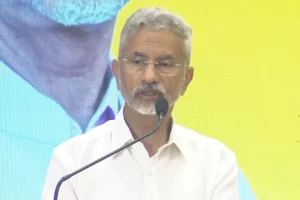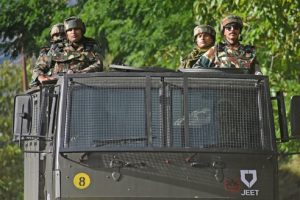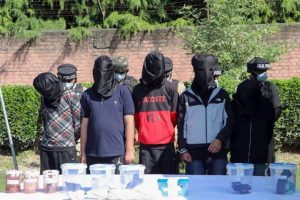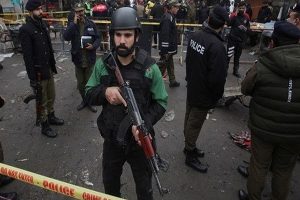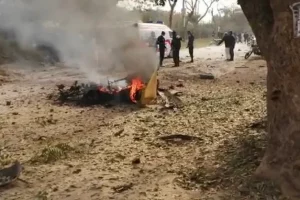The Paris-based Financial Action Task Force (FATF) will decide this week whether Pakistan should be kept in its “grey list” for further monitoring of its terror-promoting activities. The FATF meeting is being held in Singapore this week.
Pakistan has been kept on the FATF monitoring list and faced global financial sanctions for the last four years over its role in financing and sheltering terror leaders and organisations. However, as its relations with the West improve, Pakistan is likely to get off the list with US support.
Pakistan’s top homeland security agency chief avoids questions about underworld don #DawoodIbrahim and 26/11 Mumbai mastermind #HafizSaeed, both terrorists most wanted by Indian security agencies and believed to be living in Pakistan. https://t.co/IZ8KqJmiji
— Tarek Fatah (@TarekFatah) October 18, 2022
Pakistani newspaper Dawn has reported that Pakistan is likely to be taken off the FATF list which will enable it to access funding. Dawn reported: “Pakistan is expected to finally exit the ‘increased monitoring list’—commonly known as grey list—of the Financial Action Task Force (FATF) on Oct 21, after languishing in the infamous category for almost 52 months”.
Pakistan has consistently made noises about dismantling terror networks by taking action on money laundering and terror financing, but sources say that terror leaders are sheltering in Pakistan with their networks intact.
Just weeks back a US court had said that terror financing by Habib Bank led to attacks that killed and injured 370 people in Afghanistan during 2021 and 2019. Nearly 370 individual complainants are demanding compensation from Pakistan’s largest private bank. A serious allegation is that Habib Bank has financed Al-Qaeda’s terror activities as well.
Over the years several other Pakistani banks have faced scrutiny for money laundering and terror financing. American authorities have fined many Pakistani banks for suspicious transactions.
Where was Osama Bin Ladin?
In Pakistan.
Plz support the trend;#BlackListPakistan #SanctionPakistan #FATF pic.twitter.com/irITBKi79h— Zafar Sahito (@widhyarthi) October 17, 2022
A FATF team had visited Pakistan in September to check whether terror groups and their networks had been dismantled or not. Around the same time, investigative reports found that terror groups like the Lashkar-e-Taiba (LeT) were highly active and were openly delivering relief work to flood victims.
Investigations done by the Paris-based Pakistani journalist, Taha Siddiqui, found that LeT had resurfaced in all four regions–Punjab, Balochistan, Khyber Pakhtunkhwa and Sindh to supposedly help in flood relief work but in reality to recruit people for terror activities. The investigations also found that the terror group was collecting donations under a new name—Allah-u-Akbar Tehreek, in close collaboration with Pakistani military and other organisations.
The two-day meeting of the FATF that begins on October 20, Thursday, will be attended by the International Monetary Fund (IMF), the United Nations, the World Bank, Interpol and other international agencies.
The FATF is working with @INTERPOL_HQ to improve global asset recovery 👉 https://t.co/hzQ3mFwApt.
INTERPOL’s Anti-Money Laundering Rapid Response Protocol is a good example of how authorities can be helped to seize the dirty money that fuels crime and terrorism. See more👇 https://t.co/qLe8r2g3Yt
— FATF (@FATFNews) October 19, 2022
A statement by the Paris-based FATF said: “Discussions will also focus on jurisdictions identified as presenting a risk to the international financial system, with an update to public statements that identify jurisdictions as high risk or being subject to increased monitoring”.
Even as the FATF gets ready for the Singapore meet, #BlacklistPakistan #SanctionPakistan and #FATF surge on social media handles.
The FATF news comes on the back of the discovery of hundreds of bodies found on the rooftop of a Pakistani hospital in Multan. With no explanations from the government, activists have alleged that the bodies are related to the custodial deaths of Baloch and Sindhi people.
Also Read: Exclusive: Baloch activist Mahganj Baloch recalls war against women unleashed by Pakistan








